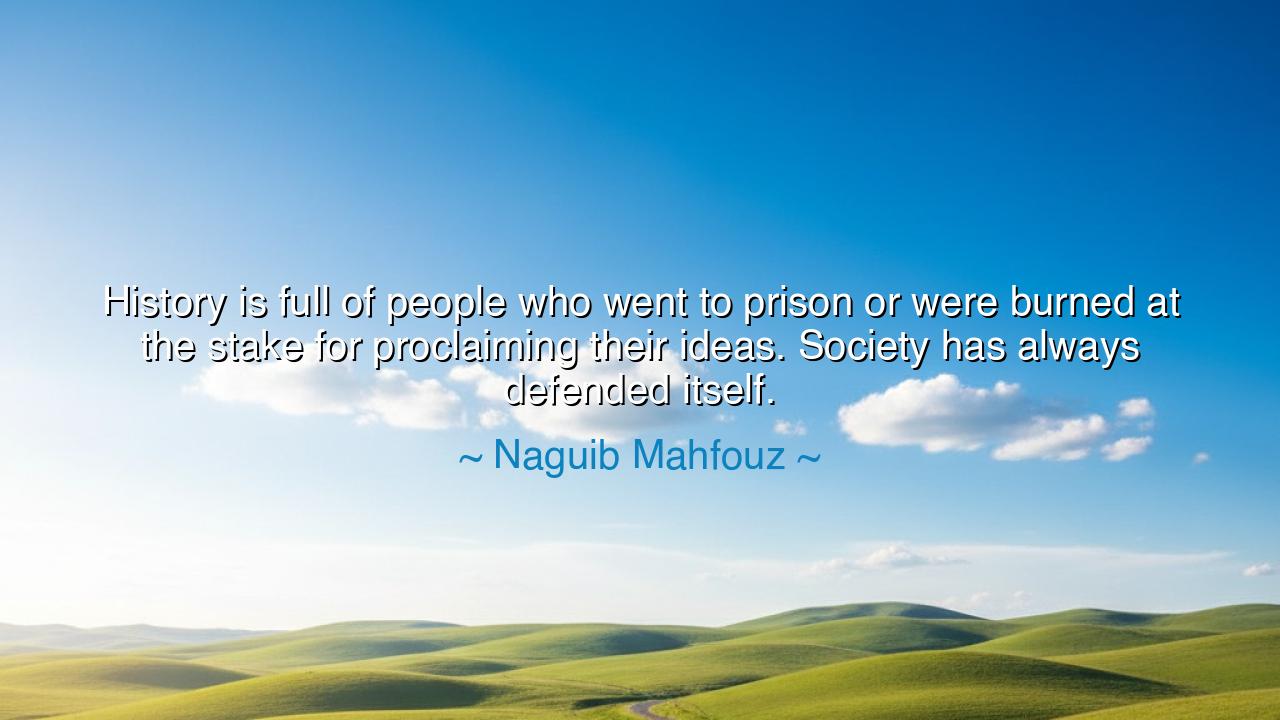
History is full of people who went to prison or were burned at
History is full of people who went to prison or were burned at the stake for proclaiming their ideas. Society has always defended itself.






When Naguib Mahfouz, the sage of Cairo and the chronicler of the human soul, declared, “History is full of people who went to prison or were burned at the stake for proclaiming their ideas. Society has always defended itself,” he was not simply reflecting on cruelty — he was unveiling the eternal struggle between truth and fear, between the visionary and the world that resists him. His words rise like a lament and a lesson, carved from the long suffering of thinkers, artists, and prophets who dared to speak before their time. For Mahfouz, who himself had faced censorship, persecution, and even an assassin’s blade, this truth was not abstract — it was personal, born of the eternal rhythm by which society protects its illusions and punishes its awakeners.
The origin of this quote comes from Mahfouz’s reflections on the cost of thought and the burden of the artist. Living in a land steeped in ancient glory and modern turmoil, he understood how every civilization fears the voice that challenges its comfort. From the pharaohs of old to the tyrants of the twentieth century, power has always called its prisons "necessary," and its burnings "justified." To proclaim a new idea is to strike the heart of tradition; and when the heart is struck, it defends itself. Thus, Mahfouz speaks not only of political repression but of a deeper instinct — the human tendency to reject the unknown, to silence what it does not yet understand.
In saying that “society has always defended itself,” Mahfouz exposes a terrible paradox: that civilizations, while seeking wisdom, often destroy their own teachers. They build walls to preserve peace, but those same walls keep out progress. The philosopher who questions, the scientist who reveals, the artist who unsettles — all become threats to the fragile order of the age. Yet without them, no age can grow. This cycle of creation and suppression is the rhythm of history itself: the old defending its sleep against the call of the new dawn. Every generation builds its temples to order, and every prophet who knocks upon their gates is first declared a heretic.
History bears grim witness to this truth. Giordano Bruno, who gazed at the infinite stars and dared to say that the universe was boundless, was burned alive by those who believed his vision blasphemous. Socrates, the father of philosophy, was condemned to drink hemlock for “corrupting the youth” — though in truth he only taught them to think. Even Galileo, who showed that the Earth moves, was forced to kneel and deny his own discoveries before the blind eyes of authority. And yet, in time, the flames that sought to consume these men became the very light that guided the generations after them. Their suffering was not in vain; for while society defends itself through punishment, truth defends itself through endurance.
Mahfouz’s insight, however, is not born of bitterness, but of understanding. He does not curse society for defending itself — he recognizes that fear is part of the human condition. The world resists change not out of pure malice, but from the terror of losing what it knows. It clings to its order as a drowning man clings to driftwood, even if that order is unjust. Thus, the visionary must not only fight against oppression, but must also forgive it, knowing that he speaks to a world not yet ready to hear. The true reformer, Mahfouz reminds us, must possess not only courage, but patience — for every truth must wait until the world grows wise enough to receive it.
There is also a mirror within this quote, a warning to every generation: that we, too, might be the defenders of error. For what we reject today, our children may one day embrace as truth. The same society that once silenced rebels now praises them as heroes. The same words once called dangerous are now quoted as wisdom. Therefore, Mahfouz calls us to humility — to listen more deeply, to question our own fears, and to ask whether our defense of “order” is in truth a defense of ignorance. The mind that cannot question itself becomes its own jailer, and the society that cannot tolerate dissent becomes the enemy of its own progress.
So, O seeker of truth, take this teaching into your heart: never fear the voice that challenges you. The ideas that unsettle are often those that awaken. Honor those who speak from conscience, even when their words discomfort you, for they are the midwives of history. Stand with those who are silenced, for they carry tomorrow’s truths. And when your own convictions are tested, defend not your pride, but your reason — for only through open minds can civilization be renewed.
And finally, remember this: though society may defend itself by silencing its prophets, truth has never stayed buried. The prisons of the just become sanctuaries of memory, and the pyres of martyrs become beacons for the generations that follow. What is punished today will be praised tomorrow. Thus, as Naguib Mahfouz teaches, history’s tragedy is also its triumph — for though fear builds its walls, truth always finds a way to walk through them.






AAdministratorAdministrator
Welcome, honored guests. Please leave a comment, we will respond soon